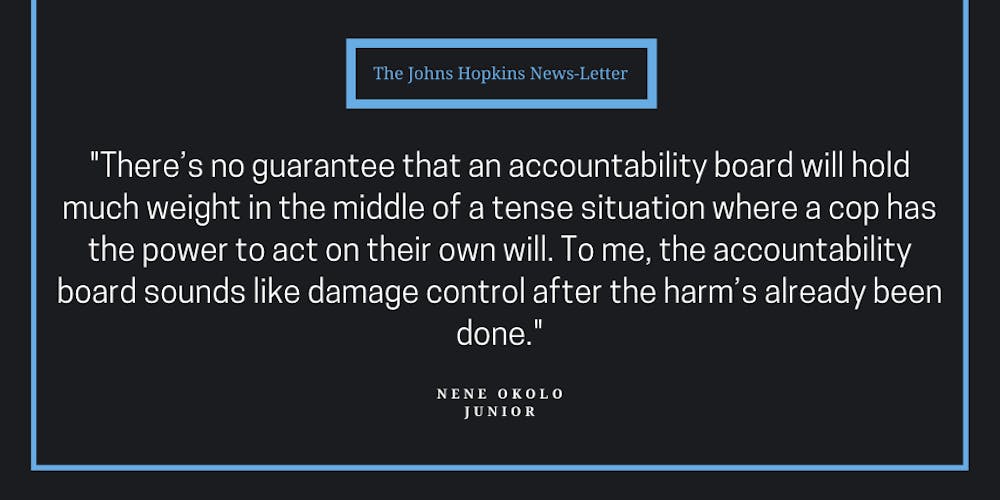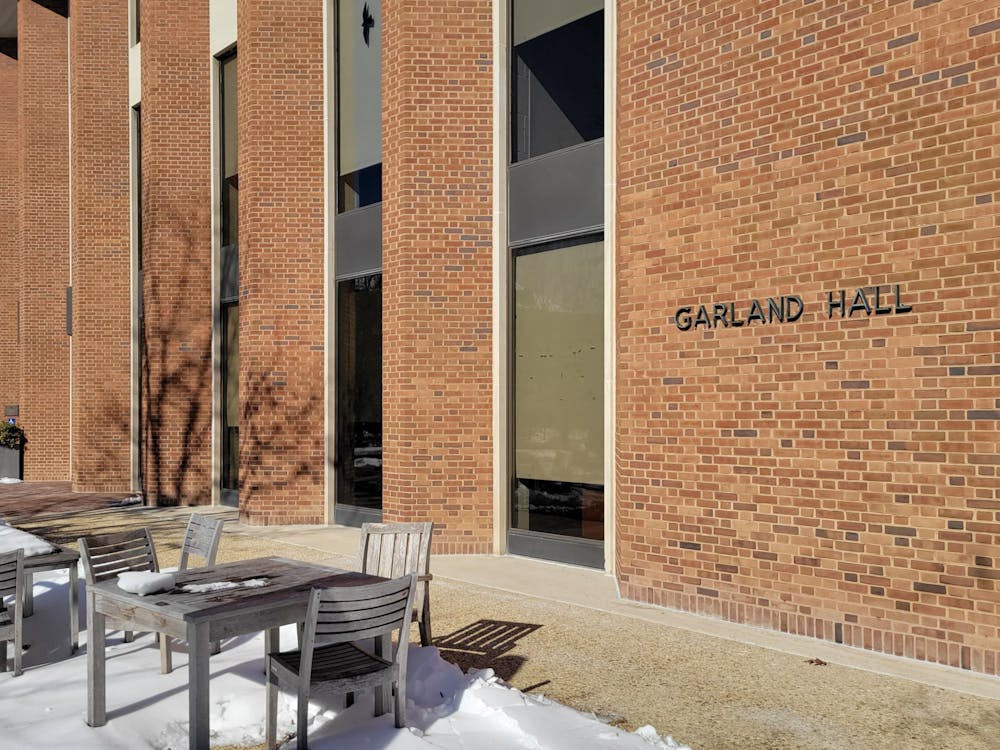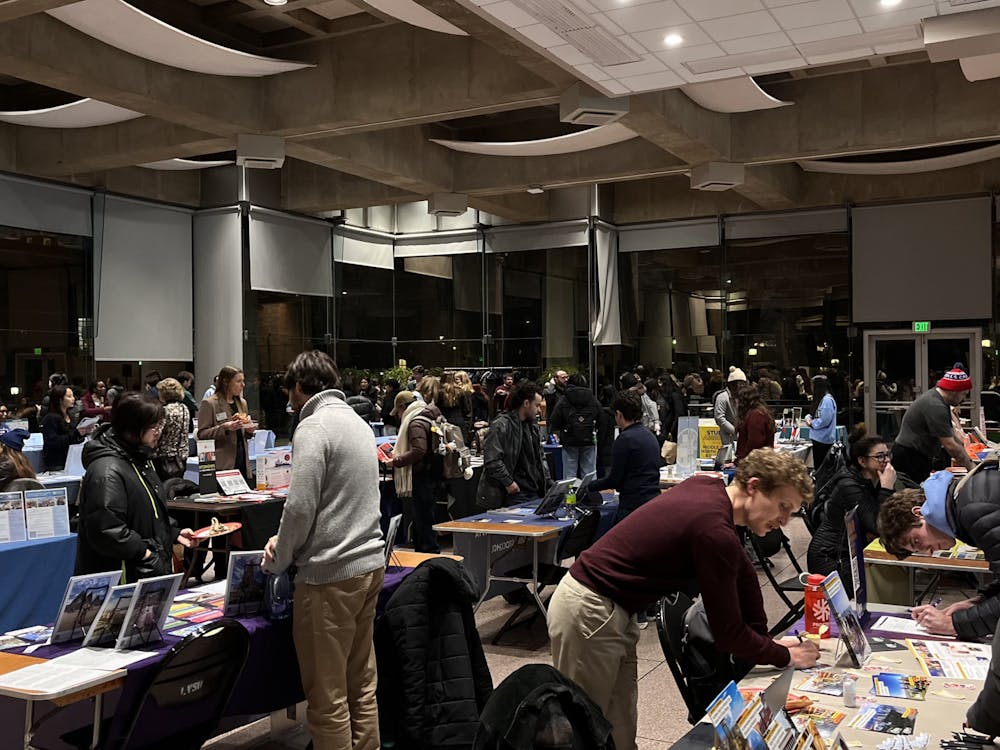The University resumed efforts to conceptualize the widely opposed Johns Hopkins Police Department (JHPD) earlier this week to skepticism from students. On Monday, the new Vice President for Public Safety Branville Bard Jr. invited the Hopkins community to share feedback about the future police force.
Bard also announced in an email that he plans to reconvene the Student Advisory Committee for Public Safety as well as the Johns Hopkins Police Accountability Board (JHPAB), which disbanded in August 2020 in light of the temporary pause of the force.
In June 2020, Hopkins delayed the implementation of the JHPD for two years in the wake of nationwide protests following George Floyd’s murder at the hands of members of the Minneapolis Police Department. Students were critical of the decision, urging the University to instead cancel plans for the JHPD altogether. Some posited that Hopkins had an ulterior motive — to take advantage of the fact that most students who were on campus during the Garland Hall sit-in of spring 2019 would have graduated by the end of the two-year period.
In an email to The News-Letter, Vice President for Communications Andrew Green denied that bringing the Accountability Board back was synonymous with progress on the police force.
“The decision to reconvene the Accountability Board does not affect the timeline for development of the JHPD,” he wrote. “It stems directly from the desire of Johns Hopkins’ new vice president for public safety, Dr. Branville Bard, to listen and learn from members of the community, both on and off campus.”
Green also shared Bard’s hopes for the JHPAB, for both now and the future.
“He views the accountability board as a pathbreaking vehicle for those with different perspectives to advise him on the institution’s vision for public safety both during and after the two-year pause in the development of the JHPD,” he wrote.
In an email to The News-Letter, junior Nene Okolo questioned how useful the Accountability Board would be in monitoring the JHPD’s partnership with the Baltimore Police Department (BPD). She pointed to the fact that 20% of BPD officers had complaints filed against them during 2020.
“The BPD... is notorious for misconduct and brutality against black Baltimoreans, so there’s no guarantee that an accountability board will hold much weight in the middle of a tense situation where a cop has the power to act on their own will,” Okolo wrote. “To me, the Accountability Board sounds like damage control after the harm’s already been done.”
During the time of disbandment, students and staff members of the original JHPAB revealed the inability of the board to take action in dealing with matters concerning the JHPD. One members cited a lack of authority and the disorganization of the Board as obstacles in effectively being able to provide input.
Coalition Against Policing by Hopkins (CAPH) member Brianna Groch expressed similar concerns in an interview with The News-Letter. She questioned the true intentions of Hopkins in its decision to restart the Accountability Board.
“I can say from this experience that student groups such as the advisory board don’t really have much effect on the decisions made by Hopkins,” she said. “Ultimately, the advisory board stands to give the illusion that the private police are supported by the Hopkins community regardless of what they do.”
Groch previously served on the Counseling Center Advisory Board and has attended the University’s feedback sessions on health and safety resources on campus as well as on the construction of the new student center.
Senior Adelle Thompson echoed Groch, encouraging students to be skeptical of the JHPD.
“Stop expecting the best out of institutions,” she said. “Personally, I don’t think I have enough trust in Hopkins to make this accountability board what it needs to be.”
Groch also argued that Hopkins should instead redirect its efforts toward funding other community services.
“Perhaps channeling funds away from gentrification projects and private police towards these communities [Hopkins has] been tearing apart for more than a century would have the desired effect on crime rates and the city’s view of Hopkins,” she said. “Policing a problem [the University] actively contributes to isn’t the answer. Reparations are.”
Green noted that during the pause, Hopkins has undertaken additional projects to support public safety in Baltimore, like the Behavioral Health Crisis Support Team and the Innovation Fund for Community Safety.
The University’s decision to proceed with the JHPD comes despite opposition from students, faculty members and University members testifying before the Maryland House of Delegates to repeal laws allowing private campus police forces.
Okolo explained that the presence of an armed police force would make Black students feel less safe.
“Black students shouldn’t have to worry about being racially profiled or assaulted by police on their own college campus, and this unfortunately happens way too often at schools with police presence,” she wrote.
Although the Accountability Board is being formed again, the University said that it will respect the two-year pause on the development of the JHPD. Hopkins does not currently know when students can expect to see the force on campus.
Applications to join the JHPAB are currently open to those who are interested.





